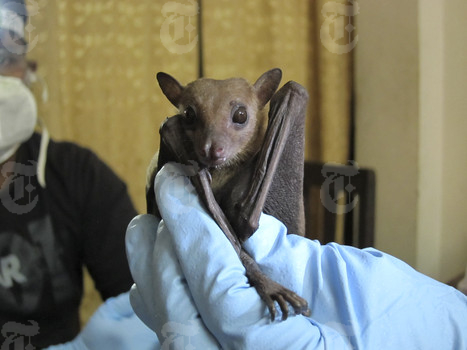Where is Guinea? It is a small West African country, population a little over 10 million - mired in poverty with great mineral wealth among its resources. It has a French colonial background, has had a variety of [mis]governance issues since independence from France in the late 1950s.
Click on image for full picture
Bats and Ebola virus
The Ebola virus is, according to emedicine.medscape.com, one of 30 viruses capable of causing viral hemorrhagic fever syndrome. Particularly virulent, with symptoms including internal and external bleeding, diarrhoea and vomiting, it kills between 25% and 90% of victims, depending on the strain of the virus...
The genus Ebolavirus is currently classified into 5 separate species, four of which are found in Africa, while interestingly, the fifth is associated with Reston, Virginia, USA: Sudan ebolavirus, Zaire ebolavirus, Tai Forest (Ivory Coast) ebolavirus, Reston ebolavirus, and Bundibugyo ebolavirus.
According to the World Health Organization (WHO), Ebola haemorrhagic fever outbreaks occur primarily in remote villages in Central and West Africa, near tropical rainforests. The virus is transmitted to people from wild animals and spreads in the human population through human-to-human transmission.Fruit bats of the Pteropodidae family are considered to be the natural host of the Ebola virus.
As of yet, there is no known cure or vaccine.
The fruit bat
Poor little thing. Bats already suffer from a stigma of vampire varieties, general creepiness, and halloween stereotypes. Now this mammal which eats fruit is found to be a host - meaning it lives with the virus inside it, without suffering ill effects. And from this reservoir of the virus, outbreaks can occur.
 A single fruit bat "in hand" Photo from www.nytsyn.com
A single fruit bat "in hand" Photo from www.nytsyn.comEnter the ban in Guinea
The country of Guinea has had an outbreak of the virus, causing 62 deaths and others possible in neighboring countries. As a result, the government has banned the sale and eating of bats as a way to lower the risk of infection.
 Fruitbats for sale in African market ... seems to Teatree like such an easy choice to avoid. Photo from worrallwind.blogspot.com
Fruitbats for sale in African market ... seems to Teatree like such an easy choice to avoid. Photo from worrallwind.blogspot.comLet's hope that helps in Guinea, and that research continues on a larger scale. The deadliness of this disease has been referenced when terror experts talk of deliberately introduced diseases, and somehow acts as a background for the zombie apocalypse genre.
2 comments:
I did not know that was an additional worry I could have had while in Ivory Coast... To my knowledge I didn't eat bat meat. However, the possibility is there that I was indeed served it and mistook it for goat, or palm rat, definitely not chicken. :)
Sometimes, it's best not to know everything ... especially the details of what you are about to, or just, ate.
Post a Comment